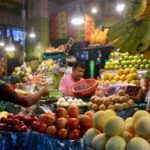In a province known for its fertile farmland and bountiful harvests, a troubling reality persists beneath the surface—childhood food insecurity continues to grow across Prince Edward Island. This summer, local organizations are responding with unprecedented expansion of meal programs designed to bridge the gap when school nutrition programs pause for the season.
The Summer Lunch Program, operated by the Adventure Group in partnership with the PEI Association of Food Banks, has witnessed a staggering 30% increase in demand compared to last year. This vital initiative now serves approximately 250 children weekly across seven Island communities, providing nutritious meals during the critical summer months.
“We’re seeing families who have never accessed support before reaching out this year,” explains Roxanne Carter-Thompson, Executive Director of the Adventure Group. “The combination of inflation, housing costs, and wage stagnation has created a perfect storm for many Island families who simply can’t stretch their budgets any further.”
The program delivers pre-made lunches twice weekly to families who register, containing sandwiches, fresh fruits and vegetables, and other nutritious items. What distinguishes this initiative is its deliberate focus on dignity and accessibility—meals are delivered directly to community hubs where families can collect them without stigma or barriers.
According to Food Banks Canada, nearly one in four children across the country experiences some form of food insecurity, with rates in Atlantic Canada trending even higher. On PEI, school meal programs serve over 8,000 students during the academic year, but summer has traditionally created a significant service gap.
Provincial funding has increased this year in response to the growing need, with an additional $50,000 allocated specifically for summer food programs across the Island. This investment represents a recognition of the critical role nutrition plays in childhood development, particularly during formative years.
“Children who experience hunger during summer months often return to school in September at an academic disadvantage,” notes Dr. Eileen Murphy, a child development specialist at the University of Prince Edward Island. “The cognitive impacts of irregular nutrition can persist well beyond the immediate physical effects.”
What’s particularly noteworthy about PEI’s approach is the collaborative model emerging between government agencies, non-profits, and local food producers. Island farmers have donated over 2,500 pounds of fresh produce to the program this season, ensuring children receive locally-grown, nutritious foods rather than merely shelf-stable alternatives.
The program has expanded beyond metropolitan Charlottetown into rural communities including Summerside, Montague, Souris, and several smaller localities where transportation barriers often exacerbate food access challenges. Mobile distribution points have been established in community centers, libraries, and recreational facilities, creating a neighborhood-based support system.
“We’re intentionally removing as many barriers as possible,” says Carter-Thompson. “Transportation, stigma, and scheduling conflicts shouldn’t prevent any child from accessing healthy food during summer months.”
The initiative also incorporates educational components, with simple recipe cards and food literacy information included in meal packages. This approach reflects growing recognition that addressing food insecurity requires both immediate relief and longer-term skill development.
As climate change impacts crop yields and supply chain disruptions continue to affect food prices across Canada’s grocery sector, experts warn that food security programs must evolve from emergency responses to sustainable systems. The PEI model, with its focus on local sourcing, dignity-centered distribution, and educational components, offers promising insights for other jurisdictions facing similar challenges.
The question remaining for policymakers and communities alike is whether these expanded summer programs represent a temporary response to current economic pressures or signal a fundamental shift in how we approach childhood nutrition year-round. As families collect this week’s meals across the Island, that question resonates far beyond PEI’s shores.

























